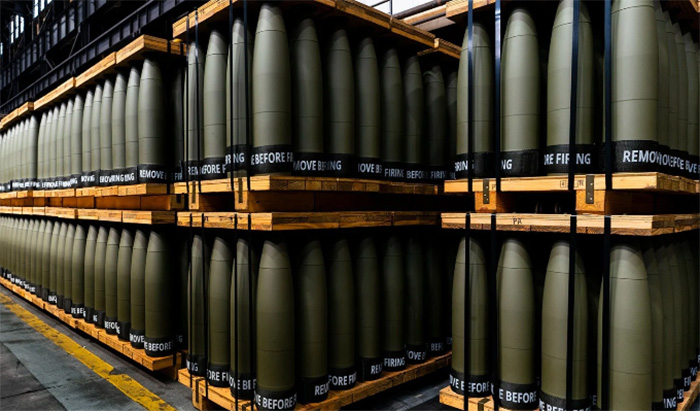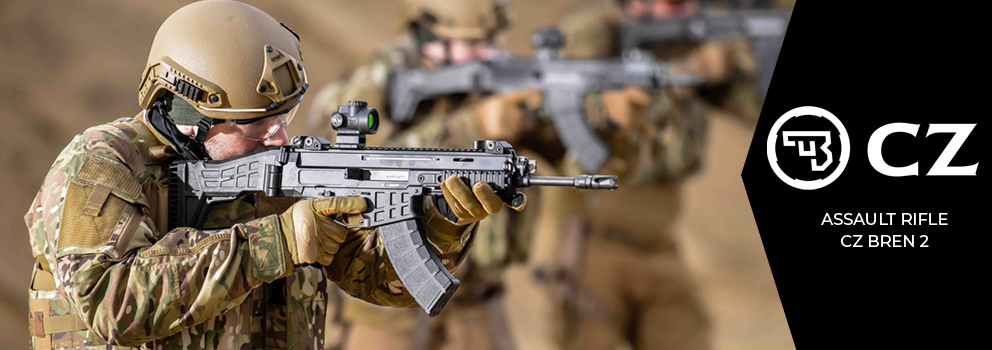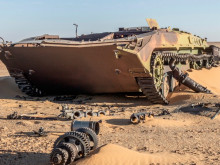Pojar, Černochová, AMOS agency. The Czech Republic and its institutions play a key role in the Munitions Initiative

It is not only in connection with the recent visit of Prime Minister Petr Fiala to the White House that public attention is focused on the so-called Czech Munitions Initiative. Various figures, amounts, estimated delivery dates, and speculations about the background of the Czech munitions initiative and the role played by state institutions and private companies, among others, have been circulating in the media. Some uninformedly claim that everything is being handled by the private sector and that the government is just "flaunting its feathers". So let us take a closer look at the whole Munitions Initiative project and its main actors.
There is general talk of a million or more artillery shells of 155 mm, 152 mm and 122 mm calibre. Prime Minister Fiala said in Washington that the Czech Republic has 180 000 pieces of artillery ammunition under contract and is negotiating another 300 000 pieces. The aforementioned one million pieces should then be seen as a tentatively identified total set, which President Petr Pavel spoke about, within which a real opportunity needs to be created through very hard diplomatic and coordination work and translated into a realised delivery to the Ukrainian armed forces.

This assistance is a key step, though by no means the only one, that needs to be taken if Ukraine is to be able to effectively repel the growing Russian attacks. It is clear that without sufficient ammunition, especially artillery, the Ukrainian army will be 'pulling the short end of the rope' on critical sections of the frontline. "The situation in Ukraine is critical... They are running out of ammunition, which means they are forced to make difficult decisions on a daily basis. This makes it extremely difficult for them to hold the lines - the same lines that will decide the security and future of the whole of Europe," Prime Minister Fiala said.
The role of the Czech state, the government and the institutions subordinate to the government in this munitions initiative is decisive and irreplaceable. The Czech Republic participates not only in the financing - according to Prime Minister Fiala's announcement in the order of hundreds of millions of crowns - but mainly in the coordination with other partners, especially NATO member states, two dozen of which have already joined the initiative. The government communicates with the partner states mainly through the National Security Advisor Tomáš Pojar and the Ministry of Defence of the Czech Republic under the leadership of Jana Černochová. The Agency for Intergovernmental and Defence Cooperation (AMOS), established in 2021, operates within the structure of the Ministry.
The project, which is crucial for the successful defence of Ukraine, has had the direct support of the Prime Minister since the beginning, and the President of the Republic has also been informed about it. Although the role of the private sector and companies that have the capability and capacity to produce artillery munitions and also have well-used foreign contacts is extremely important and beneficial, without the state and the intensive work of politicians and officials, the munitions initiative in support of Ukraine would have no hope of success and would be virtually non-existent.
The initiative was born in response to Ukraine's acute need to address the shortage of artillery ammunition, which is manifested by the deteriorating situation on the front and the reduced ability of artillery to conduct effective supporting fire - a key element of defence. The Ukrainian government has therefore turned to its partners, including the Czech Republic. In fact, before the Russian attack, the Czech government, as a first step to help the threatened country, approved a proposal on 26 January 2022 allowing the transfer of unnecessary military equipment to Ukraine, namely in the form of 152 mm artillery ammunition.
In response to the Russian aggression, an informal team was formed on 24 February 2022, bringing together key representatives of the state administration and major companies of the Czech defence industry. The Czechoslovak Group (CSG) holding company plays the most prominent role in this regard, while other companies such as STV GROUP and others are also involved in the project. The outputs of the informal team from the very first moments were mainly lists of specific material, either from the state's stocks or from the defence industry's capacities, which could be provided to Ukraine.
This informal team still exists today. The Czech Republic is constantly listening to Ukraine's needs and looking for ways to provide them and to support Ukraine in line with government policy, but also in line with the approach of our NATO and EU allies. Thanks to the experience shared in this way by the public and private sectors, coordinated by the top leaders of the country's security institutions, the Czech Republic has unique information on what stocks of military equipment or artillery ammunition are potentially available around the world.
In the case of a particular ammunition initiative, this has given the Czech Republic an overview of where and how much ammunition is available in the world and has begun to create a community of states that are able and willing to finance and support the purchase of ammunition and its delivery to Ukraine. Among the first countries to contribute were the Netherlands, Denmark and Germany, but gradually the number has grown to two dozen, which in sum means a very optimistic outlook that the initiative will not come to naught.
At the same time, it cannot be expected that an economically and logistically complex and demanding operation will be carried out in one go and within a matter of weeks, however desirable and important it is for Ukraine to implement it as quickly as possible. According to Prime Minister Fialy, the first 180 000 shells will be delivered to Ukraine in the coming months. The average monthly consumption of 155 mm calibre ammunition is reported to be in the range of 90-110 thousand pieces. This is a figure from the early autumn of 2023, and today's average will undoubtedly be significantly lower. It represents the use of approximately one-sixth of the capacity of the Ukrainian artillery, which means that five-sixths cannot contribute effectively to defence due to the lack of ammunition. According to the Ukrainian Ministry of Defence, the ideal would be to be able to consume around 350 000 shells per month, which would represent a 60% capacity utilisation.
These figures alone make it abundantly clear that, however ambitious the Czech initiative's one million grenade milestone may be, and an extremely complex task, the long-term solution must be a major increase in Western artillery ammunition production capacity. And not only artillery - in addition to shells for its artillery, Ukraine also needs, for example, very urgently guided missiles for air defence systems, and of course tank ammunition, ammunition for automatic guns of armoured vehicles, anti-aircraft guns, and ammunition. The increase in production capacities should be really considerable, because in addition to saturating the needs of the invaded Ukraine, the NATO armies' depots, which are now woefully empty, must also be sufficiently filled.




















